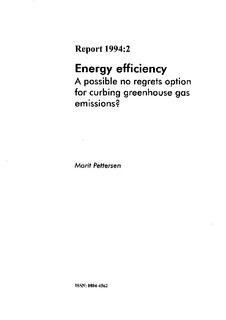| dc.description.abstract | The risk of global warming is a problem that is inherently international in its character. A solution may require international cooperation on a wide scale, but binding treaties are difficult to negotiate. Moreover, free rider incentives reduce the chances of successful implementation of these accords. Therefore, governments committed to reducing the emissions of greenhouse gases should look for areas where unilateral action may be justified. One such proposed area is the domain of energy efficiency, where improvements would lead to reduced emissions of greenhouse gases. In effect, some economists claim that in imperfect economies, possibilities for costless or profitable improvements in energy efficiency may exist. Policies aimed at realizing this potential have been named no regrets options; if there is a potential, then realizing it will be desirable even if global warming, or its related costs, should turn out to be negligible.
The purpose of this paper is to examine whether such opportunities occur or if they are just fanciful economic debates. In my study of the topic, I found that very little empirical research has been done to establish whether private companies can simultaneously implement energy conservation measures and save money by doing so. During a summer internship with the Center for International Climate and Energy Research-Oslo (CICERO), I generated data on energy efficiency investments by twenty-six Norwegian companies. These data are presented in section IV. My analyses point to a clear majority of profitable investments, thereby supporting the feasibility of no regrets options. It is not obvious why apparently profitable investments are not undertaken. One possibility could be that investments in energy efficiency are extremely risky; that the profitability of the projects is very sensitive to changes in the input variables. I have tested this hypotheses by a sensitivity analyses, but I did not find a clear evidence supporting this theory. Another possible explanation of the "paradox" of under-investment in energy efficiency, is that there may be barriers in the economy, preventing companies from realizing the potential for savings.
Section I of the paper gives a brief introduction to the problem of global warming, and in section II, possible strategies for curbing greenhouse gas emissions are examined. Section IIII describes the potential for improved energy efficiency in the Norwegian economy, and section IV examines the profitability of twenty-six Norwegian companies' investments in energy efficiency measures. Section V describes some of the barriers that may prevent realization of the potential for improved energy efficiency. The paper concludes with a brief comment on possible implications for public policy of the analyses. | nb_NO |
